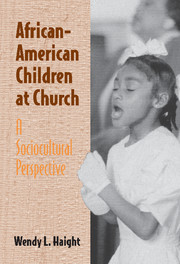Book contents
- Frontmatter
- Contents
- List of Tables
- Acknowledgments
- PART ONE OVERVIEW
- PART TWO PATTERNS OF SOCIALIZATION AND PARTICIPATION
- 4 African-Americans in Salt Lake City: A Historical and Social Overview
- 5 The Teachers
- 6 Adults' Perspectives on Spiritual Socialization
- 7 Narratives Related during Sunday School
- 8 Socialization and Participation through Storytelling
- 9 Adult–Child Verbal Conflicts
- 10 Other Contexts for Socialization and Participation
- PART THREE RELATIONSHIPS OF RESEARCH AND PRACTICE
- PART FOUR CONCLUSION
- References
- Index
10 - Other Contexts for Socialization and Participation
Published online by Cambridge University Press: 10 August 2009
- Frontmatter
- Contents
- List of Tables
- Acknowledgments
- PART ONE OVERVIEW
- PART TWO PATTERNS OF SOCIALIZATION AND PARTICIPATION
- 4 African-Americans in Salt Lake City: A Historical and Social Overview
- 5 The Teachers
- 6 Adults' Perspectives on Spiritual Socialization
- 7 Narratives Related during Sunday School
- 8 Socialization and Participation through Storytelling
- 9 Adult–Child Verbal Conflicts
- 10 Other Contexts for Socialization and Participation
- PART THREE RELATIONSHIPS OF RESEARCH AND PRACTICE
- PART FOUR CONCLUSION
- References
- Index
Summary
As discussed in chapter 1, in addition to Sunday School, children participated with adults in a wide variety of emotionally compelling weekly, monthly, and yearly events at First Baptist Church. Similar to Sunday School, in these contexts, the importance of applying biblical concepts to modern life was highlighted through story, song, and prayer. As discussed in chapter 3, these multiple contexts of observation allow for a more complete account of adults' socialization practices and children's participation. These observations contextualized Sunday School within the larger community and suggest the unique, as well as the redundant, socialization functions of Sunday School. They also provided critical checks on interpretations of practices observed in Sunday School and beliefs articulated during interviews.
KEY WEEKLY EVENTS: THE CHILDREN'S STORY
During one Sunday School lesson, Sister Justine asked the children in the junior class why they attended church. Amanda stated that she comes to church because her grandfather, who was an associate reverend, sometimes told children's stories. The others quickly agreed that children's stories were an important reason to attend church.
Children's stories, also referred to as “Children's Sermons,” occurred midway through the Sunday morning worship service. Pastor Daniels, or the associate reverend, invited children aged 10 and under to come down to the front and center of the sanctuary. As the congregation sang “Jesus Loves Me,” the children gathered in a circle around the teller. During the children's stories, the teller drew a parallel between African or African-American culture and history, and biblical concepts.
- Type
- Chapter
- Information
- African-American Children at ChurchA Sociocultural Perspective, pp. 144 - 162Publisher: Cambridge University PressPrint publication year: 2001



